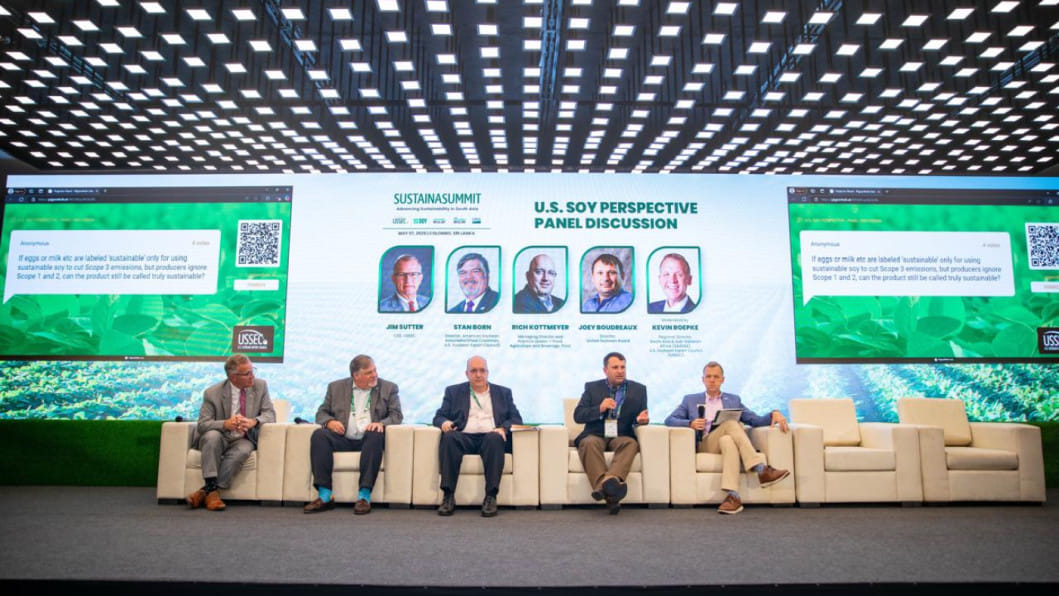Build warehouse for US soybean to reduce bilateral trade gap

Building a warehouse facility in Bangladesh for US soybean products can boost its import and help reduce the bilateral trade gap, Bangladeshi traders said at the Sustainasummit and Aqua Tech Talks in Sri Lanka.
The quality of US soy products is better than those of other countries, but the long distance and high prices are problems for Bangladeshi importers, said Syed Fardos Murad, proprietor and CEO of Ferdous Trading, which supplies technologies to the soy industry.
The price of US soy products is $10 to $15 per tonne higher than those of other countries, Murad said at the two-day event that concluded today.
Still, local traders prefer US soy products because of their quality and low moisture, he said to a group of journalists on the sidelines of the summit.
Other countries such as Brazil and Argentina have such warehouse facilities in Asian countries for quicker delivery of goods, he said.
So, if it is not possible to build a warehouse in Bangladesh, it can be built in any South Asian country, he said.
Sixty businessmen and experts from Bangladesh participated in the global summit, said Khabibur Kanchan Rahman, country team lead of Bangladesh USSEC.
Leaders from across South Asia and US soy farmers also gathered in Colombo for the conference this week, hosted by the U.S. Soybean Export Council (USSEC), according to a statement from the USSEC.
The event was organised to increase awareness among businessmen about boosting production while preserving forests and land, reducing pesticide use, and lowering carbon emissions.
The Bangladeshi participants said they want to import more US soybean products such as soy seeds, soybean oil, and soy feed.
Bangladesh annually needs 26 lakh tonnes of edible oil, of which 0.6 lakh tonnes are imported from the USA.
The development of a warehouse facility would help South Asian feed millers and seed crushers to get soy seed deliveries faster as per the demand, said Didarul Alam, CEO and lead consultant at AgroMachGlobal.
"But the question is how to reconcile the storage cost, including the storage loss, as well as the risk of storing soy seed for a long time."
"We need to do a detailed cost-benefit analysis for the investment to build the storage facility, as well as the value for money of the stored product," he also said.
If sustainability issues are addressed properly, the business environment in Bangladesh will improve and international buyers will feel encouraged to do more business with Bangladesh, said Md Nur Alam Hossain, senior consultant at PwC Bangladesh Private Limited.
Stan Born, director of the American Soybean Association and former chairman of the USSEC board, said he sees trade potential in South Asian countries. "I think we can increase our business opportunities in South Asia."
About the new Trump tariffs, USSEC CEO Jim Sutter said: "We don't know what will happen with the tariffs. There are lots of discussions going on between the people and the US government, particularly with the USTR and numerous countries around the world."
He said he hopes for some positive, new kinds of fearless and open trading systems from the new tariff regime under the Trump administration.
"We are cautiously optimistic."
Sustainably verified US soy can play an integral role in meeting customers' evolving needs for sustainable sourcing, from livestock and aqua feed to soy foods, Sutter said in the USSEC statement.
In Bangladesh and Pakistan, the USSEC has a low market share in South Asia, and there is potential to increase the market share in both countries, said Kevin Roepke, regional director of South Asia and Sub-Saharan Africa at USSEC.
He said the USSEC has been working with Bangladeshi millers, crushers, users, and traders of soybean products for a long time and they have developed a lot of skills and efficiency.
Regarding Bangladesh, he said the USSEC has the opportunity to capture up to two million tonnes more in the soybean product market.
About the warehouse facility, he said Bangladesh has a world-class soybean crushing facility and that traders of soybean products in Bangladesh are skilled enough and used to managing such operations.
The USSEC has been helping Bangladeshi traders improve their efficiency for a long time, he added.
Joey Boudreaux, director of the United Soybean Board, said, "We are very competitive. I think we can work on pricing in South Asia."
China has a government-owned soybean buying organisation and plans to import 109 million tonnes of soybean products, while Brazil plans to export 105 million tonnes this year, USSEC officials said.

 For all latest news, follow The Daily Star's Google News channel.
For all latest news, follow The Daily Star's Google News channel. 



Comments